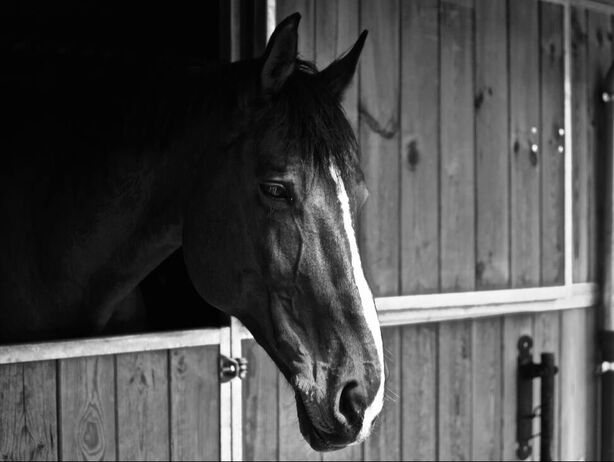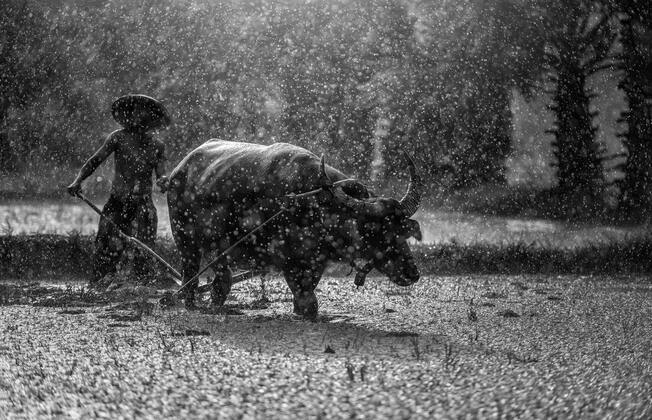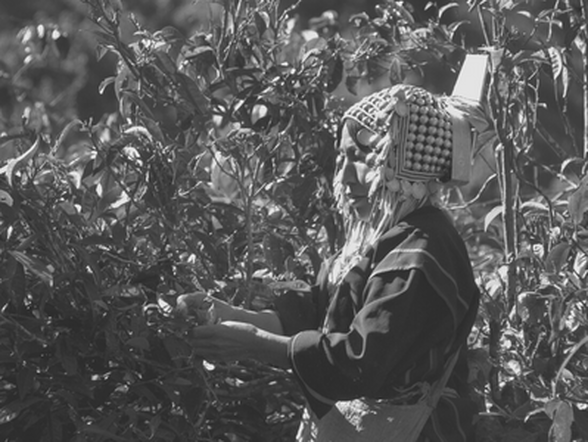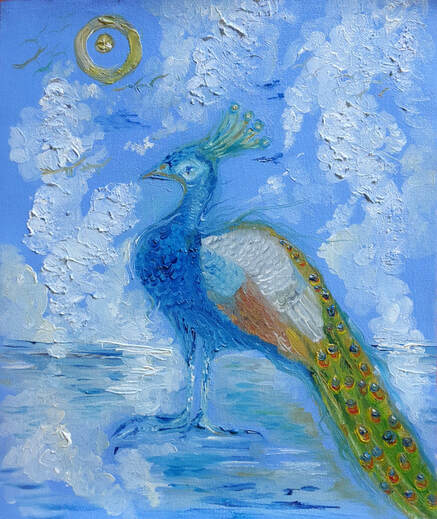|
There was once a water bearer who carried two pots of water on opposite ends of a long pole across the back of his neck. One pot was perfect, the other had a small crack. By the end of the water bearer’s trip, the pot with the crack had lost half of its water. The perfect pot sneered at the cracked pot. “The poor man works so hard to fill you up and then you can’t even keep all the water inside you. Drip. Drip. Drip.” The cracked pot felt terrible. One day it said to the man, “I am so sorry. Because of me you lose much of your hard work. I am filled with shame.” “Why?” asked the water bearer?” “There is a small crack in my side and water slowly drips out. By the time you reach the end of your journey I am only half-filled. You do not get the full value of your hard work.” The water bearer felt sorry that the cracked pot was suffering so badly. “There is no need for shame. You do what the perfect pot cannot do.” The cracked pot was incredulous. “How can this be? I do not understand.” The water bearer smiled and said, “As we walk, look to your left and then to your right. Tell me what you see.” The cracked pot thought this was ridiculous. How was looking going to erase shame? But it did what the water bearer said. “To the left there was nothing. To the right there was a lovely row of flowers lining the path on which the water bearer walked. “What do you see,” asked the water bearer. “I see a row of flowers lining the path on the right. What does that have to do with me?” “When I saw that water dripped from you, I planted seeds along the path. The water that drips from you, waters the seeds. Now there are lovely flowers along the side of the path. Had you no crack there would be no flowers.” June 2023 Stories
2 Comments
In a small town in India, a bunch of thieves had terrorized everyone. It was so bad they would tell people which house would be raided that night. If people tried to hide their valuables or call the police, they suffered dire consequences.
One day, Bapurao, a rich man received word that his house would be raided and was given the usual warning. Shaking with fear, he told his wife Parvatibai about the thieves’ plan. He said he would gather their servants and arm them so they could fight back. His wife shook her head. “Many people have tried this and no one has succeeded. We need to think of a way to outwit the thieves. “What can we do?” asked her husband. When she told him she needed to think about it, he left to collect as many men from the village as would join him. When her husband had gone, she went into the kitchen and said to the cook, “Prepare the best meal you can make for fifty people. Then set the tables with our best dishes and finest tableware. I need everything to be ready by midnight.” Just before midnight, she dressed in her most beautiful sari and took off all her jewels except her wedding ring and the necklace her husband had given her in honor of their marriage. When she heard the noise of horses hoofs she opened the door, terrified but calm. Before her stood many men, ready to storm in. Without waiting, Parvatibai said, “Welcome brothers, please come in. I have been waiting for you. Please wash your hands. Dinner is ready. The head thief wondered if it was a trick, but he could smell the food and saw that the woman welcoming him was calm and unafraid. When they were all seated, the servants attended to each man as Parvatibai made sure they all had enough to eat and drink. After dinner, she brought the head thief a dish filled with jewels and placed them before him. “Brother, this is what I have to give you. I have kept back only the necklace my husband gave me when we married and my wedding ring. Please, I beg of you, let me keep them.” The head thief looked at her, then said, “Of course I will spare them. We have eaten your meal and we are always faithful to those with whom we share food. You have called me brother and given me a brother’s welcome. From today you are my sister and I will see to it that you and your family come to no harm.” He returned the jewels and ordered his men to free her husband, their servants, and the men who had come to help and bring them back to the house unharmed. Even today, people talk about how Parvatibai outwitted the thieves. Great Spirit gathered all the Animal People together to tell them that New People were coming. All the Animal People were going to have names that would be theirs forever, handed down to future generations. The Animal People were told to come to Great Spirit’s lodge the next morning at dawn and each in turn would receive their names. First come, first served. Coyote hated his name. He didn’t want to be known as Trickster or Imitator. He wanted a great name that the Animal People would respect and honor. He would ask to be called Grizzly Bear for his strength. If that name was taken, he would ask to be called Eagle, for his swiftness. If that name was taken, he would ask to be called Salmon, the powerful swimmer. Satisfied with his plan, he stayed awake all night, putting twigs in his eyes to keep them from closing. He intended to be first so he could have the name he chose. The next morning, he was pleased to see no one was around. Surely he was first to appear before Great Spirit. Joyfully he asked to be called Grizzly Bear. Great Spirit spoke, “Grizzly Bear was already here. He has taken his name. “Oh,” said Coyote, delighted he had a strategy. “Then I will be Eagle.” “Eagle has come and gone. He has taken his name,” said Great Spirit. “Then I will be Salmon,” responded Coyote. “That is impossible. Salmon has taken his name,” said Great Sprit. Coyote was too upset to think of another name. “What name has not been taken?” he asked Great Spirit. “All the Animal People have come and gone. You are the last to appear before me. No one wanted your name.” Coyote looked so miserable, Great Spirit said, “I made you sleep so you would be last to come. I need you to be who you are, Coyote.” “But I don’t want to be who I am. I want a new name.” “I need you to keep your name. I need you to be who you are. I have important work for you to do. The New People who are coming do not know anything. You know how to laugh and cry. You are brave and cowardly, wise and foolish, hard-hearted and kind. I need you to teach the New People how to be fully human, for that is who they are, human beings.” Coyote was not convinced. “But if I am foolish, they will laugh at me. When I am cowardly, they will not respect me. How can I teach them?” Great Spirit reassured him. “When you are foolish and wise, cowardly and brave, mean-spirited and kind, they will understand that no one is always foolish, always brave, always uncaring. You will see them through bad and good times. To help you do your work, I give you special gifts. You can change into any shape you choose. You can understand and talk to all who speak to you. If you die, you will be reborn. Shapechanger, go and do your work. You will do it well.” Coyote felt his heavy spirit lighten and his heart fill with joy as he went out into the world to meet the New People, ready to do the work of Great Spirit. There was once a wise man who went to a house of learning to offer his wisdom. He expected many people to attend, but no matter how long he waited, only one person showed up. The wise man was thinking of leaving but, being polite, he asked the man, “You are the only person here, should I leave and return another time, when more people might attend?”
“Sir, I am not a wise man like you, but if I entered a stable and there was only one horse there, I would still feed it.” The wise man nodded and began to speak at great length. When he paused to take a drink, he asked, “Shall I continue?” “Sir, I am not a wise man like you, but if I entered the stable and discovered there was only one horse, I would not feed it all the grain in the stable. There was once a poor man who cut and sold wood in order to earn a living but no matter how hard he worked he never made enough money to buy all the food his family needed. Day after day, watching his children grow pale and thin, he became so discouraged he decided to end his life.
He went to a cave where he knew a lion lived and stood outside of it. “Lion, please come eat me.” The lion, amazed at the request, asked, “Why do you ask such a thing of me?” The man told him of his plight and added, “If I die, perhaps my wife will find a new husband who can take better care of her and the children.” The lion listened, then said, “If it is only money that keeps you from wanting to live, take this gold coin.” He threw the man more money than he saw in a year. Thanking him, the woodcutter rushed to the market and bought as much food for his family in one day as he’d been able to buy in a month. Though his wife was careful, eventually they spent all the money. Once again there was not enough food to feed the family. Once again, the woodcutter went to the lion, begging him to eat him. Once again, the lion threw him a gold coin. In time, the man’s wife said, “The lion has been so good to us. I think we should invite him to dinner to show him how grateful we are.” The man was not so sure. “He’s a lion. We don’t know what he likes to eat. Perhaps we should think of another way to thank him.” But his wife persuaded him. The next day the woodcutter went to the lion. “My wife and I would be very pleased if you would come to our home for dinner.” “Thank you. I shall be delighted,” said the lion with such joy the man forgot his misgivings. The next day his wife spent all day preparing the most delicious meal she knew how to cook. The children cleaned the house. The man chopped enough wood to make a splendid fire. At the appointed time, the lion knocked on the door and was ushered in by the family who kept telling him how grateful they were for his help. The meal was a great success and the man began to relax thinking how good it was his wife had thought to invite the lion. As the husband was showing the lion to the door, he overheard someone say, “He’s a very nice lion but he doesn’t smell very good.” Shocked, the man hoped the lion had not heard. When the lion did not react, the man sighed with relief. Outside, the lion said to the man, “Tomorrow, come to see me. Please bring your sharpest knife. I have a favor to ask of you.” “With pleasure,” said the man. “After all you have done for me and my family, I am happy to help you.” The next morning the woodcutter stood in front of the cave waiting for the lion. This time, after the lion gave him a gold coin he said to the man, “I want you to take your knife and slash my face to ribbons.” The woodcutter recoiled in horror. “I can’t do that. You’ve been so good to me and my family. Why would I want to hurt you?” “You promised you would do as I requested,” reminded the lion. “Are you going to go back on your word?” With a heavy heart, the man slashed the lion’s face until his face was a bloody mess. “Now, leave me,” said the lion. “Return in two weeks.” When the man returned the lion said to him, “My head heals. My heart still hurts.” In former times, the Akha had letters that contained all the wisdom of the tribe, but one year, they were swallowed by the water buffalo. The Akha moved every year and when it came to move, the water buffalo's skin was too big and too heavy for the people to move. They were perplexed. Although they did not want to leave their letters and their wisdom, they could not find a way to move the weighty skin.
They went to the Head Man. He thought about the problem and then spoke. "If we cannot move the water buffalo's skin, we must eat the water buffalo's skin. This way, we will keep the letters and our wisdom inside us, forever." And so, the water buffalo's skin was cut up into the number of people in the group. Each person swallowed a piece. Thus was wisdom kept within the tribe forever. There was once a man who lived in a small village far away from the nearest big city. He and his wife worked hard but they often went to bed hungry in order to feed their children. One night, he woke his wife and said, “I have had the most marvelous dream. I want to tell you what it was so I don’t forget it.”
His wife said, “I have never known you to have such a dream, tell me. I am listening.” “I dreamt that I went to the city and walked to a bridge spanning a wide river. Next to the bridge, guarded by a soldier, was a little hill and at the bottom of the hill, buried deep, was a bag of gold.” Neither he nor his wife knew what to make of the dream, but after he dreamed it for a third time, they decided he should go to the city. Maybe there was gold buried beside the bridge. The couple saved and scrimped until the man had enough food to walk the long distance to the city. When he arrived, tired and dirty, he saw the soldier guarding the bridge. It was all as he had seen in his dream. As he approached the side of the bridge, the soldier came up to him and said, “I have to tell someone about my amazing dream.” When the man nodded, the soldier began. “I dreamt I walked a far distance to a small village where there is a large tree shading a small house. Tangled in the roots is a bag of gold.” The more the soldier described the village, the more astounded the man was. It seemed the soldier was describing his village, the tree beside his little house. The soldier sighed. “If only I could get leave, I’d go to that village. I’d dig up the gold and no one but me would know.” The soldier seemed to be so sure the gold was in the small village, near the house, sounding exactly like where the man lived, that the man, who was afraid of the soldier, decided to go home without digging near the bridge. When he arrived home, he told his wife about the soldier’s dream. Together, toward dusk, when no could see them, the couple dug carefully around the tree’s roots. And there, before their incredulous eyes, was the bag of gold. There was once a stream that came to life in the highest of the high mountains, moving through dense forests, wide plains, and deep valleys until it came to a huge desert. No matter how hard the stream tried to pass through the desert, its waters always evaporated beneath the hot sands.
The stream was afraid it would disappear if it did not find a way to cross the desert yet was soon exhausted by its futile efforts. While the stream was resting, a voice whispered, “The wind crosses the desert and so can you.” “How?” asked the stream. “I am not like the wind. I cannot fly. I make my way along and under the ground.” “This is true,” said the voice. “But the wind can help you cross if you are willing.” “How? I am water, not wind,” protested the stream. “Let the wind carry you over the desert. Allow yourself to be absorbed by the wind. If you continue as you have, you will disappear forever,” answered the voice. The stream did not like this idea. It had always been its own master. It did not want to change into something else, not even for a short time. How could the stream be sure it would find itself again, once it had traversed the desert, carried by the wind. The stream did not believe the voice. It kept trying to cross the desert and continued to disappear. The voice whispered again, “Do not be afraid. You will once again become a stream if you let the wind carry you across the desert.” Too tired to keep fighting the sand, the stream, which was now just a trickle, sadly agreed to be absorbed by the wind. Gently the wind cradled the stream across the desert, onto the top of a very high mountain where, as raindrops, it fell softly onto the welcoming ground and transformed itself once again into a swiftly flowing stream. A long time ago, an Akha man saw a beautiful woman and wanted her to be his wife. However, she was not Akha, and he knew her parents would not approve. Still, he loved her very much and asked,” Will you be my wife?”
The woman loved the man and said, “Yes. But, what shall we do about my parents? They will never agree to this marriage.” The man said, “Let us try. Perhaps they will not come to our wedding.” But the parents came, saw their daughter in her brightly colored clothing, and took her home. Still, the woman and man were determined to be wed. They sat and thought. The woman looked at the man and said, “I have an idea. In my village, the women wear clothes of many colors. You must ask the women in your village to wear black to our wedding. I will wear black. If my parents come, they will not know who I am.” Once again, the parents came to the village to take their daughter home, but they could not find her. There was no woman wearing brightly colored clothes. All the women looked alike in their black clothing. The couple were happily married. To this day, all Akha women wear black, just to be safe. There was once an emperor who loved the beautiful colors and graceful shape of the peacocks he saw roaming around his palace so much, he asked the court artist to paint a picture of a peacock for him. For one whole year he waited and still his request was not fulfilled. In a rage, refusing to wait any longer, the emperor stormed into the studio demanding the painting.
Frightened by the emperor’s anger, yet calm, the artist slowly brought out paper, paint and brush. In a few minutes a perfect picture of a peacock emerged. Now the emperor was purple with outrage. “If you can paint a perfect picture of a peacock in five minutes, why did you keep me waiting for over a year?” “Come with me.” The emperor followed the artist to the storage room. Paper was piled from the floor to the ceiling. On every sheet was a painting of a peacock. “Your Majesty,” explained the artist, “it’s taken me more than one year to learn how to paint such a painting in five minutes. |
World TalesAge old stories of wit and wisdom from around the world. Tales retold by Nancy King. Archives
April 2024
Categories |
Copyright © Nancy King 2020 | Site Design by Angulo Marketing & Design
|
|
Nancy King is a widely published author and a professor emerita at the University of Delaware, where she has taught theater, drama, playwriting, creative writing, and multidisciplinary studies with an emphasis on world literature. She has published seven previous works of nonfiction and five novels. Her new memoir, Breaking the Silence, explores the power of stories in healing from trauma and abuse. Her career has emphasized the use of her own experience in being silenced to encourage students to find their voices and to express their thoughts, feelings, and experiences with authenticity, as a way to add meaning to their lives.
|











 RSS Feed
RSS Feed